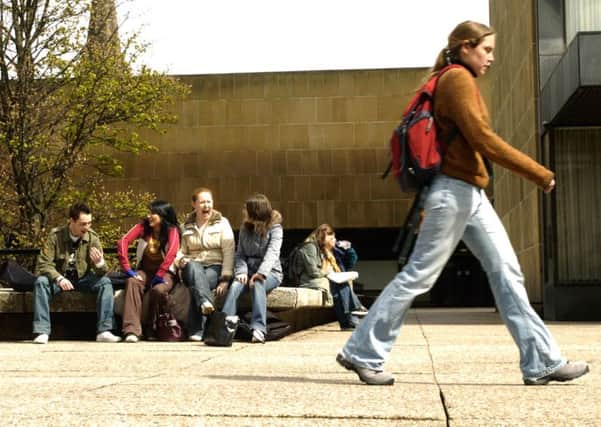61% of students work during term time - survey


A survey found that 61 per cent of students work outside of their university degree.
The average student earns £4,478 annually, working just eight hours per week during university term time, according to the report from Santander. Outside of term time however, the typical figure rises to 18 hours.
Advertisement
Hide AdAdvertisement
Hide AdAlmost a third of students are employed for at least 30 hours a week - on top of their degree work - equivalent to full time employment.
However, six per cent earn between £12,000 and £30,000 per year. The average UK wage is £26,500 a year.
The report also found that the amount a student is likely to work depends on what they are studying.
Finance and accounting students earn the most at £7,037 per year, while those studying law or business and admin are the most likely to be in paid employment, with 69 per cent of students on these courses working.
However, those taking courses in medicine and dentistry - which usually have the heaviest workload in terms of class hours - are least likely to work in addition to their university responsibilities.
Student welfare groups warned that students’s academic life could suffer if they have to spend time working on top of their studies.
Gordon Maloney, President of NUS Scotland, said: “It’s really worrying that so many students have to work throughout term-time just to pay the bills. With over half of students stating they’re working to cover their costs, this could be a clear warning sign that our poorest students aren’t receiving the financial help that they need.”
“Students having to rely on income from work is a huge problem, as it means that people from poorer backgrounds may have to choose between studying and feeding themselves. Studying is like a full-time job, and all students should receive enough financial support to be able to focus on their studies properly.”
Advertisement
Hide AdAdvertisement
Hide AdHe added: “We need to make sure that no-one is shut out of education simply because they can’t afford it. NUS Scotland will be working between now and the Government’s final budget in February to ensure that we see increases in financial help for our poorest students. Education must be about your ability to learn not your ability to pay.”
A third of those students who say they have jobs work in the retail industry, while a further 21 per cent are employed in a bar or restaurant. Other jobs popular among students include telesales and admin positions, while a few manage to make money by writing a blog or engaging in paid work for a charity and some undertake manual labour or are paid for performing in a band.
Fifty-eight per cent of students said they earn money to cover university costs, whilst gaining work experience for future employment prospects, ensuring a good standard of living where they can afford luxury goods and saving for life after university were also frequently cited as reasons for looking for work.
Steve Pateman, head of UK banking at Santander, said: “Paid employment not only offers students valuable work experience, it also helps cover the rising cost of attending university.”
A recent report from Experian found that one in five parents of students have faced financial pressures to support their children through university - including paying for accommodation, travel and utility bills - with 10 per cent reporting that they had had to borrow or use credit cards to cover the expense.
SEE ALSO